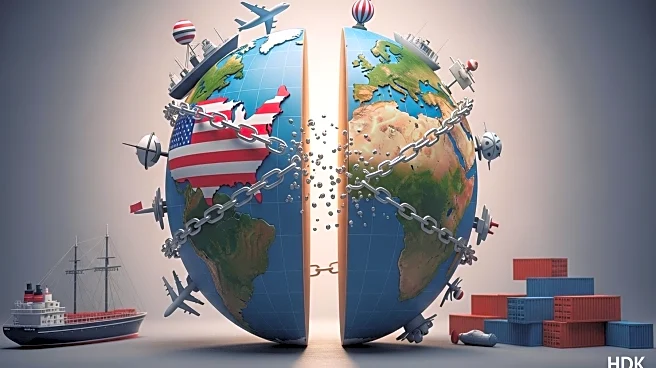What is the story about?
What's Happening?
The African Growth and Opportunity Act (AGOA), a pivotal trade agreement granting duty-free access to African goods in the U.S., is set to expire, creating uncertainty for thousands of workers. AGOA has been crucial for countries like Kenya and Lesotho, supporting industries such as textiles and agriculture. The Trump administration's tariffs have already impacted exports, and the potential end of AGOA could exacerbate job losses. Kenyan President William Ruto and other African leaders are lobbying for an extension, while also pursuing bilateral trade agreements with the U.S. The lack of clarity over AGOA's future has already affected production and employment in factories like Shona EPZ in Nairobi.
Why It's Important?
The expiration of AGOA could have significant economic repercussions for African countries, particularly those reliant on U.S. markets. The agreement has facilitated industrial growth, job creation, and poverty alleviation by replacing aid with trade. The potential job losses could impact over 66,000 workers in Kenya alone, many of whom are women. The situation underscores the importance of stable trade policies and the need for African countries to diversify their export markets. The uncertainty surrounding AGOA highlights the challenges of negotiating trade agreements in a rapidly changing global economy.
What's Next?
African leaders are intensifying efforts to secure an extension of AGOA and negotiate new trade deals with the U.S. President Ruto expects to sign a bilateral agreement by the end of the year, while urging for a five-year extension of AGOA. The outcome of these negotiations will be critical in shaping future trade relations and economic stability in Africa. The potential lapse of AGOA could prompt African countries to explore alternative markets and strengthen intra-African trade through initiatives like the African free-trade area.
Beyond the Headlines
The potential expiration of AGOA raises broader questions about the sustainability of trade-based development strategies and the ethical implications of relying on external markets for economic growth. The situation highlights the need for African countries to enhance their domestic industries and reduce dependency on single trade agreements. The focus on trade over aid reflects a shift in development philosophy, emphasizing the importance of economic self-sufficiency and resilience.
















